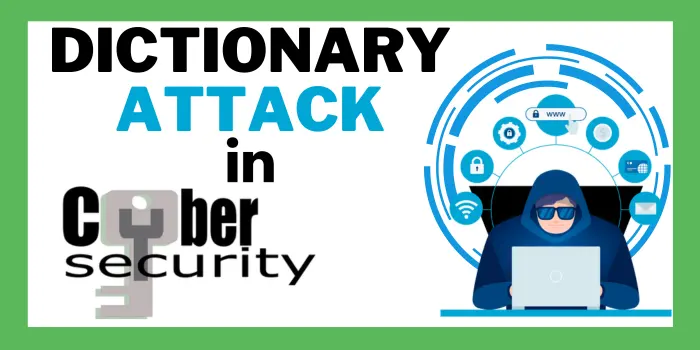A dictionary attack is a brute-force attack that uses a list of common words or phrases to guess a password. The attack will typically use a wordlist that contains thousands of million words, and they try each word in the list until they find the correct password.
A dictionary attack is a means hackers use to gain unauthorized access to a computer by trying different word and phrase combinations to crack passwords.
The purpose of this article is to provide a thorough explanation of dictionary attack In cyber security, their strategies, and how to defend against them.
What Is A Dictionary Attack?
A dictionary attack is a way of breaking into a password-protected computer, network, or other IT resource by inputting every word in a dictionary as a password one by one. Dictionary attacks are often successful because many people use simple, easy-to-remember passwords.
Also, Dictionary attack in cyber security can be automated, which means that an attacker can use a computer program to try all of the words in a dictionary very quickly. Dictionary attacks can be used for cracking passwords, decrypting data, and email accounts, among other things.
What Is A Dictionary Attack Virus?
A dictionary attack virus is a sort of malicious software that makes repeated attempts to guess passwords using a prepared collection of popular words or phrases, also referred to as a “dictionary.”
The virus automates the process of attempting various word combinations, making password cracking more successful and efficient. However, you can also use a lock bit claims ransomware attack if you face issues like dictionary attack Viruses on your devices.
What Is An Example Of A Dictionary Attack?
In order to guess the password of a user named John Smith, for instance, an attacker would utilize a dictionary that comprises the phrases john, smith, password, 123456, and so on. Then, one by one, they would try each of these terms until they found a match.
How A Dictionary Attack Works?
A dictionary attack can work online and offline. In online attacks, the attacker will make many attempts to enter the target accounts by using a password made up of each word on the list. If the target account receives a lot of traffic, this kind of attack could be slow, but it might also succeed if the attacker is persistent.
Through an offline attack, the attacker will obtain a copy of the password hash for the target account. Even if the true password is unknown, the password can still be validated using the unique value provided by the password hash.
The attacker will next use a dictionary attack program to check each word in the list against the password hash. If the program discovers a match, the attacker has cracked the password successfully.
What VPN Can Use For Dictionary Attack In Cyber Security?
ExpressVPN is another popular VPN service that provides strong encryption and a number of security features. It also has a kill switch and a strict no-logs policy, which means it does not keep any data about your internet activity.
How To Protect From Dictionary Attack In Cyber Security?
There are a few things that you can do to protect yourself from dictionary attacks:
- Using a VPN can help protect against dictionary attacks in cyber security by generating a strong password that is at least 12 characters long and has a combination of uppercase and lowercase letters, numbers, and symbols.
- VPNs are especially helpful for remote workers as they provide secure access to the company network from any location.
- Avoid using common words or phrases in your passwords.
- Change your passwords regularly.
- Use a password manager to help you create and manage strong passwords.
By following these tips, you can help to protect yourself from dictionary attacks and keep your accounts safe.
What’s The Difference Between Dictionary And Brute-Force Attacks?
Dictionary attacks and brute-force attacks are two types of cyber attacks that try to guess a password by trying different combinations of letters.
A brute-force attack tries any possible character combination, while a dictionary attack simply tries passwords that are widely used or that the attacker is aware of.
A brute-force attack is more likely to succeed if the password is short or simple, although trying every possible combination can take a long time.
A dictionary attack can be prevented if the attacker does not have a list of popular passwords, but it is more likely to be successful if the password is long or complex.
What Is The Purpose Of A Dictionary Attack?
If you fill in the easy password when naked your password is for any kind of thing like websites, or applications. There is a big chance of a dictionary attack. With the help of dictionary attack In cyber security. You can protect your privacy from the third person who wants to unblock your easy password.
Are dictionary attacks still effective against strong passwords?
Dictionary attacks are generally less effective against strong passwords that incorporate a combination of random characters, numbers, and symbols. Strong passwords with sufficient complexity make it challenging for attackers to guess or crack them using pre-existing dictionary word lists.
Conclusion For Dictionary Attack In Cyber Security
As we discussed on this page, dictionary attack In cyber security is a very essential thing for our privacy or sensitive data. It is effective against weak passwords but less so against strong ones that contain random characters. Dictionary attacks have become less effective thanks to security measures like multi-factor authentication.
Read this from the above very carefully, it will definitely help to know everything about dictionary attacks.
